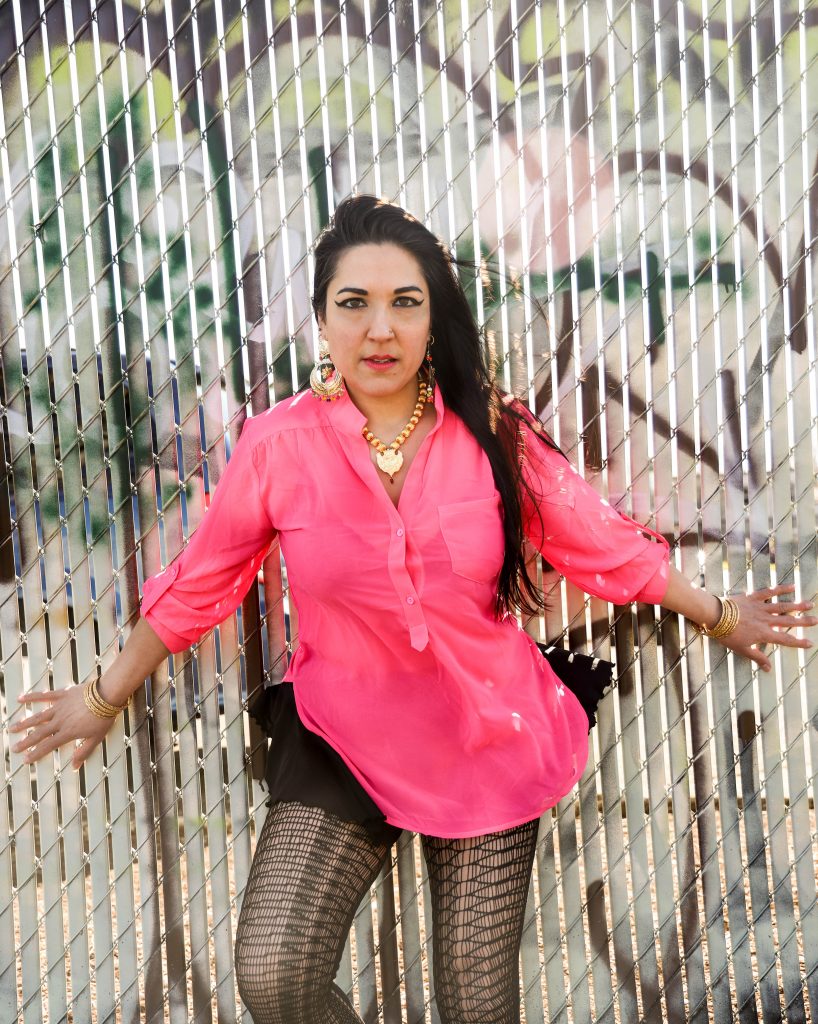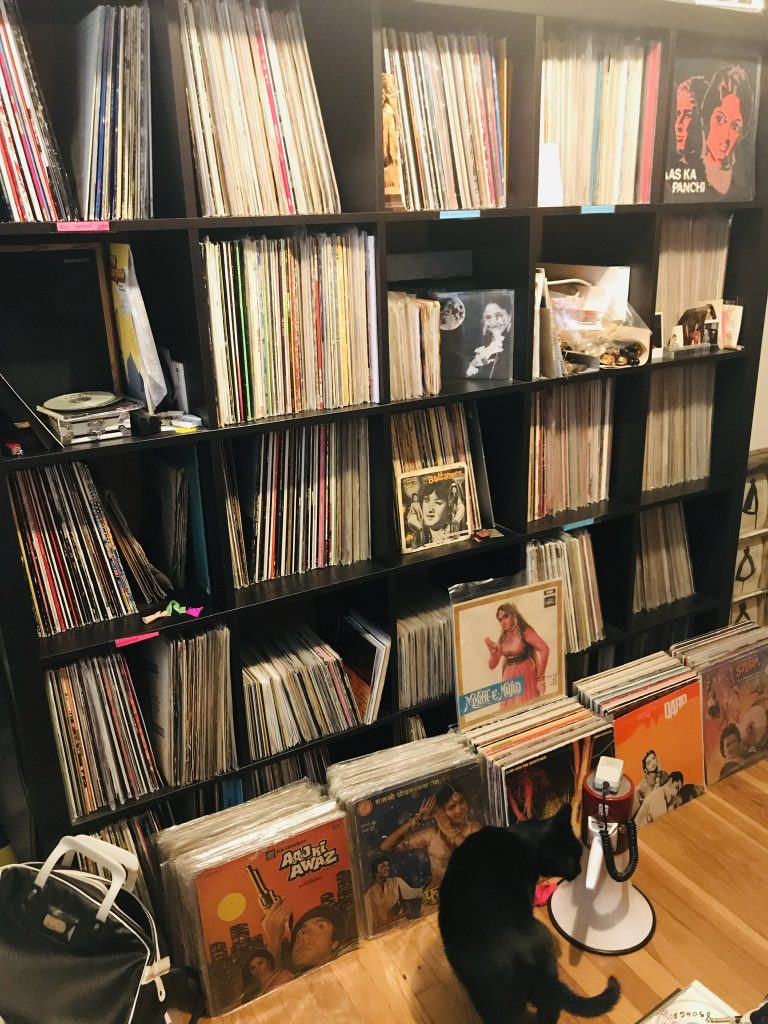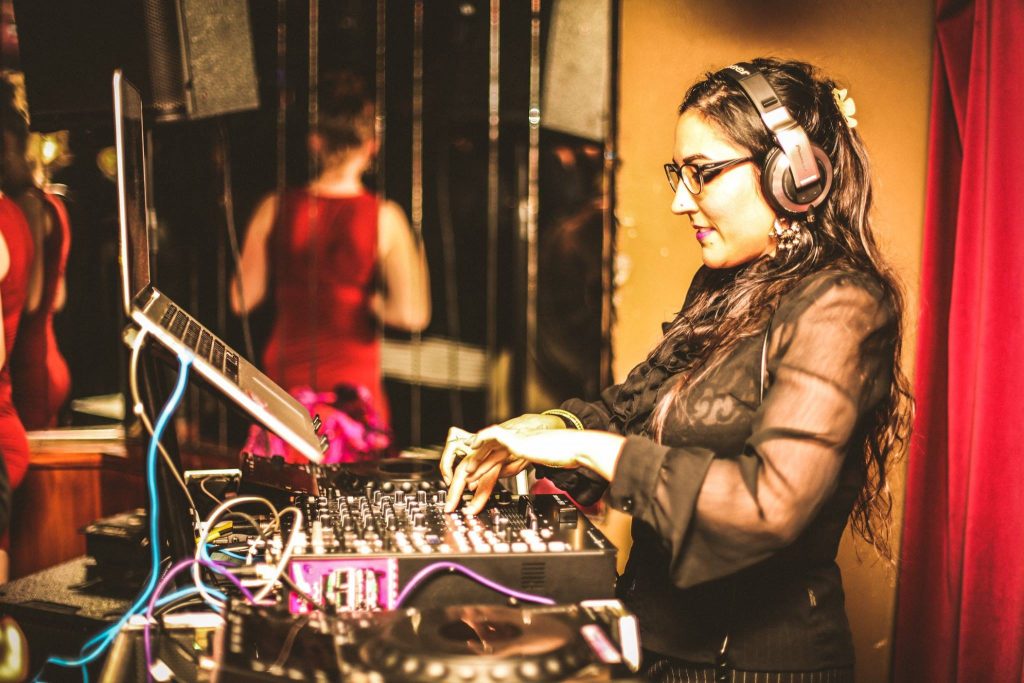DJ Anjali


It’s an unseasonably sunny Monday at the Portland Mercado, and Anjali Hursh is radiant. Better known as DJ Anjali and half of DJ Anjali & The Incredible Kid (Stephen Strausbaugh), she has been a staple of the local scene that she helped create in the early ‘00s. If you live in Portland and enjoy a night out dancing, you’ve seen her spin. Whether it’s the Desi-Latino Soundclash: Tropitaal, the Bhangra Bollywood dance party: ANDAZ, or her annual NYE rager, Anjali is the premier Portland dance DJ.
The “Desi” in Desi-bass, Anjali explains to me, means “from the country” and is a more appropriate description than Indian or Pakistani as it doesn’t have national limitations. Her music is inclusive, exciting, and when she’s on the decks, everyone on the floor is family.
In the following conversation, glean some insight into what got her started, the fateful road trip vinyl score that became the backbone of her record collection, and what keeps the party going with the marvelous DJ Anjali.
ELEVEN: I’ll leave it to our readers to get the full backstory of your first needle drop, but when was the moment you went from “exploring the DJ thing a little bit” to, “I want to do this all the time.”
DJ Anjali: I had been studying classical Indian dance for like two years and went to my teacher’s house out in Beaverton-Hillsboro a couple times a week. Studying with little kids and teenagers, I’m 24 something — 25. Then I started DJing, and I was in this in-between phase where I still wanted to be a dancer. The Kid was like, “You need to get your own equipment. You need to practice at home.” I was like, “No, I’m not a DJ. I’m just doing that for fun. I’m a dancer.”
11: “I’ll just use your equipment.”
DJA: Exactly, or just show up at the gig.
11: Right, and use what they have.
DJA: Yeah, and that’s my practice. The gig is my practice. I moved to New York briefly, thought I was gonna study dance. Then I was like, “No, I just like going to Indian parties.” Came back, and kept DJing. It went from bar to club, and it kind of exploded. I think it was 2004.
11: Wow. So dance in the late ‘90s, when did you start DJing?
DJA: I started DJing [around] 2000. We’d been DJing Lola’s Room for a minute, then at the Fez [Ballroom]. That all started in 2002. In 2004, I [was] taking The Kid to India for his first trip. At Powell’s, they let you take a leave of absence every three years up to six months, and you get your job back. So it’s great if you want to travel. I was just a few months shy of three years and the store manager was like, “Yeah, I’ll approve it, Anj. We wouldn’t want to lose you!” Then the corporate person was like, “Denied.” I was like, “Fuck it, I am going anyway. Going to India is more important to me right now.” I came back and I was broke as fuck. A couple months later, we came back and I was so broke, but I was like, “I’m gonna be a DJ.”
11: When you were in India, did you have any club experiences, or was it more of a meditative, self-reflecting time?
DJA: That 2004 trip was my first trip back without my mom. It was like my first “you’re on your own” [trip], sink or swim. It all comes back to the language and everything, from going so many times as a kid. When you go with your family, your trip is so protected. Whoever the native speaker is that’s with you, they take care of everything, so you’re sheltered when you go with your family. Most Indian families are not going to let you explore whatever neighborhood you want. So it was liberating in that way to go on my own.
I have to go back a little. Our first club gig was at Lola’s Room. We’d been playing at the Blackbird and [other small venues]. We played these little free parties, and then you do your first club in Lola’s Room. It’s 300 people. We each get a check for almost a thousand each or whatever, and I was like, “Cha-ching!” And Stephen is like, “You can’t rely on it.” It was a couple years later, in 2004, and I was really, really broke for a long time. But I was like, “I don’t care. I don’t want a boss.” I know that people love what we do. It was old Portland, my rent was couple hundred bucks.
11: Right. It was a very different time.
DJA: I could sell my book collection or record collection if worse comes to worst, which I definitely did. Culled through that shit so many times.
11: So getting back from India, you decided to go full time DJ?
DJA: I did go back to Powell’s super part-time, like one day a week, and then later just on-call.
11: I’ve got a two-part question. How did you source music back then, and how has that changed from how you source music now?
DJA: It’s so different. Back in the day [I would] go to the west suburbs, to the Indian grocery stores, and that’s where they had CDs and tapes. We would go to New York, and then we would go to San Francisco, sometimes Berkeley. We would go to Surrey, BC a lot because we weren’t as busy with gigs back then, so we’d be like, “We have a weekend off! Let’s go to Canada!” and road trip. We’d come home with boxes of CDs. We did play Bollywood that we could find here because they would have the new Bollywood stuff. But if it was UK Bhangra, that was harder to find.
11: When you’re shopping in BC, do you know what artists you’re looking for, or is it guesswork?
DJA: It’s both. We do have a vintage Bollywood vinyl store though in Surrey where there were all these shops. I don’t know if you’ve been to Vancouver, BC, but there’s Main Street which is in Vancouver, and that’s the Little India. It’s like Little Punjab in the suburbs. We knew all the store owners and we’d go in and check out their CD selections.
Then, one day, there were some records on the wall and I was like, “Can I look at those?” They’re old, I don’t know if they’re Bollywood or Punjabi, but I was like, “Yeah, I’m gonna buy these.” He was like, “You want more of this stuff?” And I was like, “Yeah!” He calls up some old Punjabi uncle, and he’s like, “Yeah, they’re gonna come over right now.” We went down the street to some massive suburban mansion. Punjabi uncle invites us in, the front room is his music room and his vinyl is immaculate. I don’t think he played very many of his records, [they were] kept in plastic, alphabetized. So we scored! Of course he only wanted cash, so all the cash we had we bought a couple boxes of vinyl. We came home, crossed the border in my muscle car, and we’re just like, “Hopefully they don’t ask to see the trunk ‘cause there’s a lot of music in the trunk.”
I obsessed about what we didn’t buy. So I called him back up and his wife answered, she only spoke Punjabi, so she hung up on me! I had to get my mom to call her back. My mom arranged us to come back. We drove back, bought more, still didn’t buy everything, and I’m still like, “Aw, we still left some of that shit there.” That was the bulk of both our collections.

11: That’s an incredible story.
DJA: It was insane. I don’t know. You go to New York Record Convention back in the day, they’d sell a Bollywood record for 50, 60 bucks. We were buying these for three dollars Canadian.
11: What a score! So that’s still gotta be the secret treasure of your collection, but in this digital era, if you’re putting together a set for a weekend show…
DJA: It’s all SoundCloud, iTunes, and then… The Kid is really good about following a lot of blogs. For me, there’s the BBC Asian Network. They have an entire station devoted to South Asian music where there’s Punjabi news or what’s the hot AC Urban sound coming out of the UK. I listen to that a lot. We have to kind of keep up with what the new Bollywood is.
11: Do you have to, or do you want to? How is that sound constantly evolving, or your sound constantly evolving?
DJA: We have to because we do some South Asian weddings.
11: Awesome.
DJA: It’s interesting! We do maybe five a year. Often times it’s a mix, like the bride or the groom, or the bride of the bride, two brides. Somebody South Asian in the wedding party. We’re good at doing the mixed weddings. The Kid has PTSD over weddings because they can be really brutal. Indian weddings can be total shit shows.
For ANDAZ, we’re committed to that party because it’s like our baby — the party we started at Lola’s and we took to the Fez. Maybe it’s just a habit? We’ve been keeping up with that music for so long. But yeah, you have to listen to a lot more shit. A lot of it’s really bad, and when it’s really bad, we won’t play it.
11: You’ll remix it to make it good.
DJA: Yeah, we’ll find the good remix, definitely. And that’s the thing, that party has never been necessarily the top 40 Indian party. If you go to New York or Chicago, their version to our party is very mainstream, and we’re all just like, “No, we’re gonna play the Desi chopped-up remix that you might recognize.”
11: Any recent finds that resonate with you?
DJA: There’s a guy named Kone Kone. He’s an American dude, I believe, based in India, been there long time. He’s been making some killer remixes of ’70s and ’80s Bollywood stuff. We both adore him and we’re in touch with him. He’s super sweet, love his stuff.
Off the top of my head, the song I’m obsessed with right now is a new Wiley and Sean Paul song that’s super grimey.
11: True or false: music transcends culture.
DJA: Yes, absolutely. I’m not a religious person, not even really that spiritual, but I feel like music is the divine for me. You know what I mean? Not all music, but some music can bring you to tears, right? Or almost stop you in your tracks.
11: Make you feel things.
DJA: I’m not, by any means, fluent in Hindi, Punjabi, or Spanish, but I feel the music. Obviously lyrics are important, and some of the songs, we know what the lyrical content is. But if it’s dance music, I don’t know if people are actually paying attention. Music, it doesn’t really matter where you’re from, you’re obviously drawn to certain music.
11: Well, that goes with the transcendent thing, and dance as well. What is the intersection of music and dance for you? Are you thinking about dance while you’re DJing, or is it just a natural side effect of music? Does dance come from music, or is it a marriage?
DJA: Yeah, it’s one and the same for me. In the early days, when my technical abilities were really blah, I think I kind of let my body guide me. If I hear a song, I’m like, “OK, this will work,” Mixing my BPM, that’s great.
My mom was a classically trained dancer in her childhood, and later she performed in India. Then in my childhood here, she performed at Indian functions. I was always drawn to it but couldn’t find the right teacher. It’s a sadness in my life. At 25, I was like, “I’m never gonna do the thing I wanna do!” I thought that this particular North Indian classical stuff was my dance. Every time I would see it performed, I would weep. Missed opportunity! Like I missed my calling in life.

11: What brought you back?
DJA: Well, I figured out [Bhangra] is my dance. In India, every state has their stereotype. Everybody thinks that I’m Punjabi because I play so much Bhangra, but my family is from Maharashtra. My mom grew up in Madhya Pradesh, different state. My family is pretty reserved. They’re not the party people.
Punjabis have this stereotype in South Asia as being the party people. I feel that music so much. Ever since I started DJing, it electrifies me, and that’s maybe how dance came back into my life, I guess.
I teach Bollywood as well, but it’s really informed my classical training. If I’m DJing, I’ll just run out and go dance and then come back.
11: Do you feel that’s where you have a leg up on some other shows? I’d say at Anjali shows, people are actually dancing and not just standing with their arms crossed and nodding their heads. Do you get more of the energy from that?
DJA: Yeah, I attribute that to the music, not to me. But people do obviously love it when I come out and dance. I really think it’s the music and who comes to our shows.
11: People come out to dance and they know that it’s going to be a dance party.
DJA: People say, “Oh the vibe at your party is so great!” We can only do so much, and then it’s up to who comes.
11: The audience is fun and inclusive. You mentioned ANDAZ. What’s a little synopsis of your monthly shows? So our readers know why they should go to these.
DJA: We do ANDAZ pretty much every last Saturday at the Liquor Store. We started that party in 2002, still running strong. That’s all Bollywood, Bhangra, what we call “Desi bass,” which is stuff that doesn’t fit in those two.
11: What is “Desi bass”?
DJA: Desi is, for me, a better word to use than Indian or Pakistani because it means “from the country.” It doesn’t have those national limitations.
Our other party is called Tropitaal, we do that party pretty much every second Saturday at the Good Foot. Sometimes first Saturday, usually second Saturday. That’s Latin with Desi bass. We play some Bollywood there. We play a lot of Bhangra, Dancehall, Cumbia, Reggaeton.
We try to have guests maybe every other month of that party. We don’t want to be like, “Here’s Latin music played by us.” We want to promote Latin DJs and performers mostly from Portland to be like, “Share your music with our audience.”



